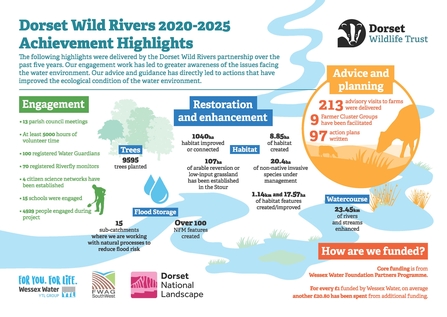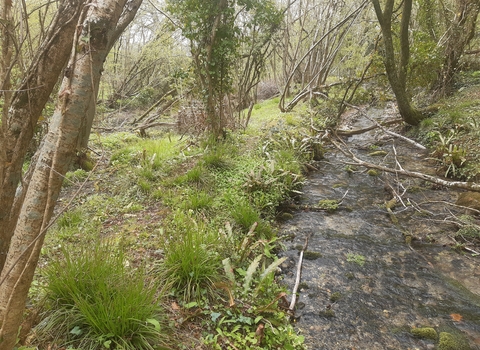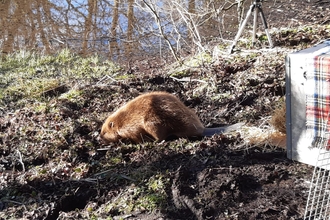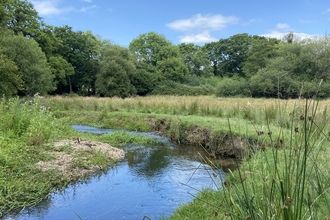Dorset Wild Rivers is a partnership between Dorset Wildlife Trust, Farming and Wildlife Advisory Group South West, Dorset National Landscape and the National Trust Purbeck Estate, funded through the Wessex Water Foundation Partners Programme Phase 7. Dorset Wild Rivers is an established model which has been operating in Dorset for over 20 years. The main aim of Phase 7 is to increase biodiversity by delivering catchment nature-based solutions. Phase 7 started in April 2025. You can see what we achieved in Phase 6 below.

Dorset Wildlife Trust
Project area
Dorset Wild Rivers is a county-wide project but will focus on waterbodies where our methodology will make the greatest impact and is most useful to the Catchment Partnerships.
Each of the main partner organisations will lead on different geographic areas of the project, as well as supporting the other partners where particular specialist knowledge is needed.
Dorset National Landscape lead work on the West Dorset Rivers and Coastal Streams, in particular on the Char, Monkton Wyld Stream, Simene, Brit, Mangerton, Asker and Swan. DNL have strong skills in partnership development, natural flood management, community involvement, citizen science and monitoring.
Dorset Wildlife Trust has a particular focus on the catchments related to the charity’s key land holdings and at catchment-scale. Working on both its own land and with the land managers around those sites. Examples of where work is planned include on and around Lyscombe Nature Reserve (Little Piddle and Chesel in the Devil’s Brook catchment), on and around Winfrith and Tadnoll Nature Reserve (Win and Tadnoll Brook catchments), working with landowners and farm clusters in these areas. The organisation has a particular focus on wetland restoration (stage zero approaches), beaver-ready landscapes, species recovery, citizen science and achieving the ’30 by 30’ target for landscape-scale nature recovery.
FWAG South West are focused on working with farmers and farm clusters to achieve the project outcomes. This work lies within a number of catchments through three main work streams:
• Dorset Rural Run-off - 23 locations identified with issues of rural land use impacting on overland flows. Using Nature Based Solutions for climate resilient communities.
• Engagement with 8 farm clusters annually to deliver Dorset wide initiatives and to identify opportunities for implementing LNRS water-based priorities and promote habitat connectivity.
• Using new Higher Rivers and Wetland actions to identify nature based solutions to riparian habitats whilst reducing downstream flood risk, initial priorities include in the Lodden, Lower Piddle and Corfe.
National Trust Purbeck Estate are focused on the Swan Brook and Corfe catchments, working with communities, land managers and on their own holding, including with tenants. Building on existing work on the Swan and taking that approach further and aiming to work with a new Landscape Recovery partnership. The organisation has a focus on natural flood management, beaver-ready landscapes and developing community-led action.
Delivering catchment nature-based solutions
These allow for natural processes within river channels, floodplains and wider catchments, allowing space for water and moderating low and flood flows. It will provide cleaner water through addressing sediment and nutrient inputs at source and disconnecting flow pathways. This will also help embed resilience to climate change.
The outputs will include:
- Rivers and streams enhanced;
- Wetland created and enhanced;
- Working with natural processes to reduce flood risk;
- Reducing diffuse water pollution from farmland;
- Wet woodland planting;
- Development of water vole recovery plans.
Working in partnership
Partnership is the foundation of our work. We endeavour to increase the scale of positive co-ordinated action across our partnership to deliver and make a difference in our precious rivers and catchments. We will also embed our partnership in other initiatives and maintain an outward-looking focus. We are working with Landscape Recovery groups, farm clusters, Natural Flood Management schemes and supporting the delivery of the Dorset Local Nature Recovery Strategy.
Engagement
We will provide high quality engagement opportunities leading to empowerment to take action across all levels – individuals, farmers, communities and organisational. Following a model that with awareness we can inspire and enable action, which then builds a movement for change: As a result more people will be not just be aware but be involved and leading change in their own patch. Communities and individuals will be connected with rivers through volunteering opportunities, events and citizen science such as riverfly monitoring.









